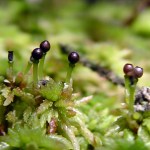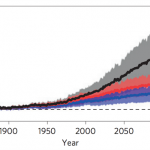carbon sink
A new study, “An unexpected role for mixotrophs in the response of peatland carbon cycling to climate warming” by Vincent Jassey and others, just came out in Scientific Reports. The study is fairly preliminary, but fascinating, and unfortunately may signal that yet another effect of global warming that would result in more global warming.
What makes this study interesting is that it examines the detailed ecological relationships between several different kinds of organisms in both field and lab settings, in order to get a handle on what they do when conditions warm. Mixotrophs are organisms…
Focusing on Earth, but also a few tidbits on wind, fire, and ice, some current news and observations about global warming.
Earth
As humans release greenhouse gas pollutants (mainly CO2) into the atmosphere, the surface of the Earth, and the top 2000 meters of the ocean, heat up. But some of the CO2 is absorbed into plant tissues and soil, as well as in the ocean or other standing water. Historically, about 30% of the extra CO2 is absorbed into the ocean, and another 30% converted into (mainly) plant tissue. We hope that enough CO2 is absorbed that the effects of greenhouse gas pollution is…
Oceans are 'soaking up less CO2' is the headline of a recent BBC News article. (Well, it is recent in most senses of the word though not in blogger-land...Rabbet Run discusses it here, Stoat did it here, and Michael Tobis blogged about it here).
So the news is that a some new research indicates that the rate at which atmospheric CO2 is being absorbed into the ocean is falling. The findings are new, the authors are not sure if natural varibility is involved or not, but regardless it is a troubling sign. If it does turn out to be the case it signals the cessation of a free ride nature has…

